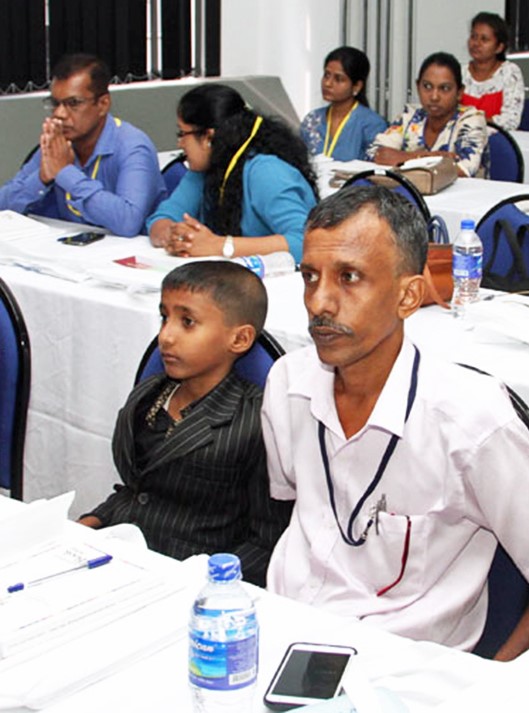Convention on Literature for Children and Youth—2019
The first-ever convention on Literature for Children and Youth organised by the Sri Lanka Section of the International Board on Books for Young People (IBBY) was successfully held on 5-6 April 2019 at the Sri Lanka Foundation Institute in Colombo. The Convention was inaugurated by the State Minister of Education, Hon.Vijayakala Maheshwaran who attended as the Guest of Honour. A total of 120 persons participated over the course of 2 days. They included authors, illustrators, publishers, academics, teachers, librarians and child and youth welfare officers, as well as officials of the Ministry of Education, National Institute of Library and Information Services of Colombo University (NILIS), National Library Services Council and the National Institute of Education.

The State Minister of Education and the Secretary of the Ministry of Education lighting a traditional oil lamp to commence the Convention.
The main highlight of the Convention was the launch of a project report published by the Ministry of Education’s School Libraries Development Branch. The result of 2 years of research, this publication enumerates the criteria for creating, as well as selecting children’s storybooks. Prior to this publication, there was no set of guidelines for either authors or publishers. As the report is currently available only in the Sinhala language, the IBBY Sri Lanka Section has undertaken the task of translating and printing the report in the Tamil and English languages as well. The translated versions are scheduled to be launched in early May 2019, at the National Reading Programme Awards Ceremony.

Mr.R.H.N. Nandasiri, Project Head, presenting the first copy of the project report to the State Minister of Education.
Another highlight was the feting of 6 officials attached to national programmes for developing reading. Thus, 4 directors of the Ministry of Education, the Librarian of the National Institute of Library and Information Sciences of the University of Colombo, and also a director of the National Library and Documentation Board were honoured by the IBBY Sri Lanka Section, for the services rendered to produce the selection criteria book, as well as for creating and implementing the National Reading Programme.
The President of IBBY Sri Lanka Section, Dinesh Kulatunga, also handed over a letter to Mr.Prasanna Ranaweera, Director of the National Institute of Library and Information Sciences of the University of Colombo, requesting the establishment of a Research Centre on Literature for Children and Youth.

Mr.Dinesh Kulatunga, President of IBBY Sri lanka (L), handing over
the letter of request to Mr.Prasanna Ranaweera, Director of NILIS.
Furthermore, a 232-page Convention Book containing academic papers and selected essays was presented to the guests and participants. This publication also highlighted innovative library projects conducted by individuals and non profit organisations. The book was printed on behalf of IBBY Sri Lanka Section by Neptune Publications, using special print effects used for the first time in Sri Lanka.

The objectives of this maiden Convention were:
- Understanding the true status and feasibility of literature for Sri Lankan children and youth.
- Identifying avenues of raising the appreciation of literature for children and youth.
- Identifying a programme to increase interest in literature for children and youth among children, youth, teachers and parents.
- Updating knowledge and evaluating regional and international literature for children and youth.
- The impact of translations on Sri Lankan literature for children and youth.
Covering the above objectives, the following presentations and academic papers were presented during 2 days:
Literature for children
- Considerations when creating a literary work for children.
- International trends in children’s literature and English children’s literature.
- Reading and comprehension in early childhood development.
- Illustrating for children’s literature.
- The spread of children’s literature: through the Press and electronic media.
- International experiences of children’s literature.
- The influence of stage dramas and tele dramas on children’s literature.
- Children’s storybooks and illustrations.
- Tamil children’s literature.
- Children’s literature and the electronic media.
- Songs, poetry and children’s literature.
- Selection of content matter for Sinhala readers for primary students.
- Evaluating and selecting children’s literature.
Literature for youth
- New trends in youth literature.
- The arts and youth.
- The personality traits of youth and the complexes faced by them.
- Development of reading of youth literature.
- The spread of youth literature in Sri Lanka.
- The art of translating youth literature.
- Reviewing and analysing youth literature.
- International experiences of youth literature.
- The influence of stage dramas and tele dramas on youth literature.
- Language usage in youth literature.
- Tamil youth literature.
- The electronic media’s contribution to youth literature.
- Evaluating and selecting youth literature.
The Convention became a reality through several institutions and organisations joining forces with IBBY Sri Lanka. The Ministry of Education, the Department of Cultural Affairs, the National Institute of Library and Information Sciences—University of Colombo and Room to Read contributed their know-how and specialist personnel. The main event sponsor was Neptune Publications (Pvt) Ltd, while the other sponsors were Wasana Bakers, Lions’ Club of Mulleriyawa, Wijeya Newspapers Ltd. and Express Newspapers (Ceylon) Ltd. (print media sponsors), Sri Lanka Rupavahini Corporation (electronic media sponsor), Stepping Stones Montessori (translation sponsor) and Garads Advertising (advertising and design sponsor).
A noteworthy point was the request of 3 child authors to participate at the Convention. Upon receiving permission from the President of the Organising Committee, all 3 participated, accompanied by a parent.
Outcome of the Convention
The appreciative comments and positive feedback of the participants was spontaneous and immediate. Their enthusiasm was evident, as many had travelled long distances to participate at the Convention. However, the best indicator of the Convention’s success was the participants’ reaction to a question posed by the Convention President, prior to concluding the event. When asked if they would participate in a follow-up convention next year, all hands went up immediately.
(Pix by Saman Weeraratna)







